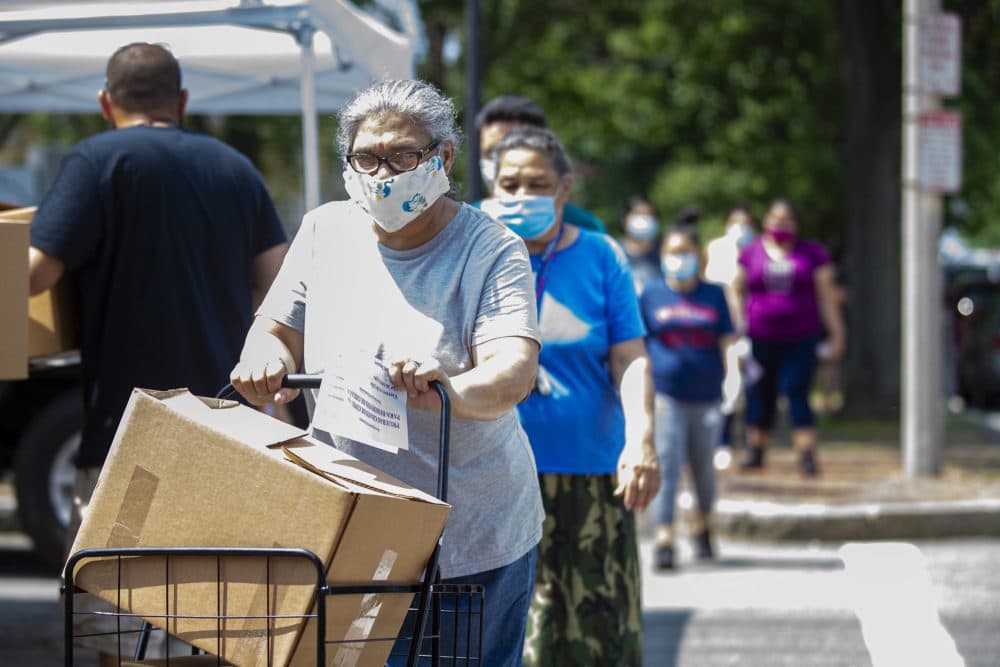Advertisement
Commentary
The Guaranteed Income Program In Chelsea, Mass. Should Be A National Model

What is happening in Chelsea, Mass. should not stay in Chelsea. It could spell the end of poverty-level incomes in America.
Six months ago, as COVID-19 swamped the economy of the majority-Latino city, officials rolled the dice on a new strategy: dispensing up to $400 a month, via debit cards, to 2,000 families, funded by local government, federal coronavirus relief and nonprofit organizations. Necessity midwifed the strategy, City Manager Tom Ambrosino told WGBH’s "Greater Boston": local food pantries were gobbling up city resources, and that “was becoming unsustainable. We were also spending a lot of money on non-food items — trucking, packaging, temporary employees.”
Swapping cash for services, a Harvard University study of the Chelsea program found, has resulted in recipients spending 75% of the $2.1 million distributed on food as intended. Similarly heartening results have attended cash handouts in Brazil and smaller trials in Canada, Kenya, Finland and Stockton, Calif. Cash instead of goods is becoming best practice in global poverty relief.
Uncle Sam runs more than 100 poverty programs — cash aid to needy families, SNAP, housing vouchers and Medicaid among them — through multiple departments. They keep many from destitution. But to state the obvious, they haven’t abolished all poverty, partly because, for all the hundreds of billions they cost, the end result can be rather inadequate aid reaching individuals.
In this era of Build Back Better Bidenism, here’s a suggestion: Experiment with building a bigger, better version of Chelsea nationally. Let’s pilot the replacing of all those poverty programs with a single program, the guaranteed income, run by a single agency — the Internal Revenue Service.
This is not Andrew Yang’s universal income, mind you, a giveaway that’s unaffordable and premised on a so-far illusory robocalypse of automated workplaces. But targeting the poor, by marrying the ideas of two geniuses — Martin Luther King, Jr. and the right-wing economist Milton Friedman — could be “the world’s simplest plan to end poverty.”
Let’s pilot the replacing of all those poverty programs with a single program, the guaranteed income, run by a single agency -- the Internal Revenue Service.
In his last book, “Where Do We Go From Here: Chaos or Community?” King advocated giving every household enough cash to raise them to the national median income, the bull’s-eye of the middle class. That figure today is roughly $69,000.
If that sounds like something Sen. Bernie Sanders would dream up, Friedman suggested a delivery mechanism as elegantly simple as it was conservative (before Donald Trump lobotomized conservatism). Friedman’s “negative income tax” reverses the normal dynamic. Instead of people writing checks to the IRS, the IRS writes checks to low-income households, based on a percentage of the difference between their incomes and some target earnings level.
Friedman wanted to simplify and de-bureaucratize antipoverty, turning much of the job over to IRS computers, while trashing the onerous qualifying rules in current programs. If the government plugged King’s numbers into Friedman’s scheme — paying 100% of the difference between a poor household’s income and that $69,000 median — a family of three making, say, the poverty line wage of $22,000, would receive $47,000 over the course of a year.
Advertisement
While the IRS would claw back a dollar for each dollar of extra earnings over that amount that a household earned, people’s annual incomes would always be middle-class. And what would they spend those incomes on? Fears that they’d fritter it on non-necessities ignore the responsible money management demonstrated in Chelsea and other living laboratories for guaranteed incomes.
Those sites also rebut anxiety that cash bleeds off recipients’ work ethic (the dubiously alleged problem with pandemic-elevated unemployment insurance). Experts on the “myths about poverty” point out that being poor is less about indolence than the fact that a staggering 44% of U.S. jobs pay dirt, and offer no fringe benefits. Those “lazy bums” often hold down multiple jobs to make ends meet.
Cash instead of goods is becoming best practice in global poverty relief.
We should not penalize recipients who used public cash to stay at home with their children — an evolving consensus properly deems parenthood as essential as paid labor — or for education, an investment in future employability. Both activities explained much of the (small) labor force dropoff noted in guaranteed income experiments in the 1970s.
Anyway, the point of a test is to confirm or confound critics’ fears, with a statistically significant number of recipients getting cash instead of the current panoply of programs for an appropriate time. Rerouting money from those programs would cover much of the cost, and there are ample sources if more were needed.
The first box to check should be a radical rewrite of personal and corporate income taxes. Purging all or most loopholes would enable lower tax rates and money for progressive investments like a guaranteed income. With baubles for both right and left, it’s folly that Democrats and Republicans haven’t front-burnered tax simplification.
Experience teaches, as King wrote, “that no matter how dynamically the economy develops and expands, it does not eliminate all poverty.” Our COVID experience suggests Prophet Martin also foresaw 2021’s reality: “We are likely to find that the problems of housing and education”-- and hunger, pace Chelsea --”instead of preceding the elimination of poverty, will themselves be affected if poverty is first abolished.”
